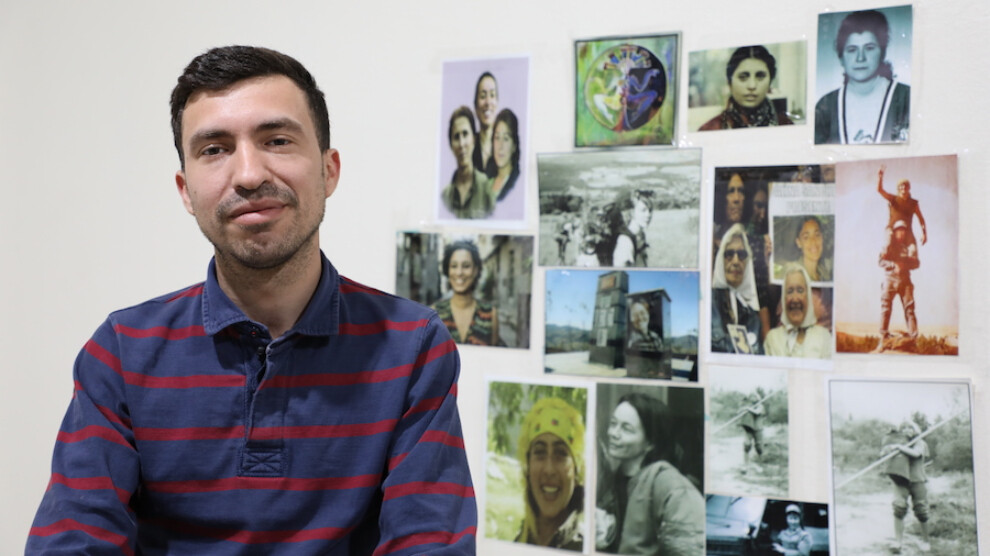Spanish activist Tekoşer: The Rojava Revolution marks a new beginning for internationalism
Internationalist Tekoşer is from Castilla, in the Spanish state and has been in Rojava for approximately three months.
Internationalist Tekoşer is from Castilla, in the Spanish state and has been in Rojava for approximately three months.

Internationalist Tekoşer attended the conference organised by the internationalists in Rojava. He is from Castilla, in the Spanish state, and has been in Rojava for about three months.
Speaking to ANF about the conference, he said: “This conference has been a series of very important experiences; it has been a historic moment for all of us, it’s the first time in the history of Rojava that all the internationalists working here, in Rojava, can come together. There have been able to open a lot of debates, to talk about our concerns, our desires, about the problems here, about the problems in our own countries, the doubts about our role here or in our countries. The truth is that it has been a very, very enriching experience. It has been a great opportunity to live it, and above all, it has been very nice to meet colleagues from all over the world and see that we are fighting for the same thing.”
Tekoşer added: “I think that the revolution has had many successes, it has brought many improvements. I think that there is still a lot to be done and that should be the main driving force for us to continue working in the same direction, because it is the right direction. The Rojava revolution has had a very big impact on all internationalist struggles. It has meant a before and an after, I think that internationalism was not at its best before the Rojava revolution and the call that began during the liberation of Kobane and was extended to all the comrades who came here. For example, you can see that less than a year ago the Zapatista comrades came to Europe to strengthen internationalism, so I think that the experience of Rojava, of so many people who have come here, have learned and have returned to their countries of origin is bearing fruit.”
For the Spanish activist, “internationalism should be based on unity. At the end of the day, here in Rojava, we come to Rojava with very different ideologies and we learn to coexist, to talk, to exchange experiences, we learn methods from each other, we learn to review ourselves, to generate self-criticism, to improve our own tools. This is a very important value, unity. Another very important value is the value of dedication, learning to leave everything to give everything. This is another of the values that we learn by coming to Rojava and I think it is one of the most important values as well.”
For Tekoşer, “internationalism plays very different roles in the defense of the revolution, not only the physical defense, which is perhaps often the most visible, but also the spreading of ideas in our places of origin, the transmission of the values of the Rojava revolution, the diplomatic work that is done, an example of this is how a region within the Spanish state, Catalonia, has recognized the self-administration as a legitimate actor with which to dialogue, to exchange. This is how the work that we internationalists do here is materializing and then returning to our countries of origin. It is essential, internationalism, as I mentioned before, means learning and sharing. If we are not willing to learn from other cultures, other ways of doing things, other values, we will always repeat the same mistakes. For me, it is very clear that it is necessary to travel, that it is necessary to learn from the revolutions around the world in order to improve ourselves, our collectives and our struggles.”
Tekoşer continued: “The truth is that I arrived at the conference without knowing very well what to expect. I have not been here long, but as the days went by I noticed how the feeling of community was growing, how the illusion was growing inside me to finally end up very happy, re-signifying and re-knowing what I want to do here and why I am here, so it was a very important moment.
For me, the role of women should be that of the vanguard. I believe that women are, in the end, as Öcalan said, the first oppressed nation, therefore they should be the first to liberate themselves. I believe that women, not having been so influenced by the state mentality, have the key to liberate all of humanity and I believe that we men have to do much more work, because we are much more influenced and we cannot allow ourselves to let our comrades be the ones who come to liberate us, but we have to be the ones who do the work of following them in this struggle.
For me, the most important decisions that were taken during the conference were those that were aimed at facilitating the organization of internationalists here so that we can develop projects that later have an impact on our places of origin or that allow us to have a more protagonist role in the Rojava revolution.
I have to tell you that revolution is possible, that Rojava is not a dream, it is a reality. That together we can reach a new world. I believe that Rojava can teach us how to give us tools, methods to achieve it, but I believe that throughout Europe a revolutionary current is emerging and I think it is our duty to know how to read the moment and to know how to act accordingly.”